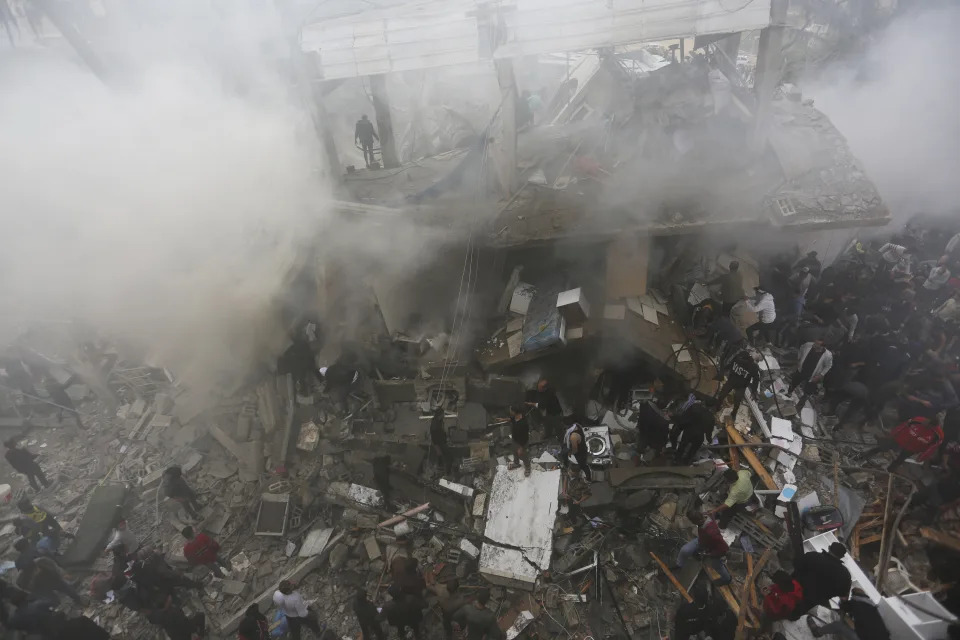Israel vows to fight on in Gaza despite deadly ambush and rising international pressure

Israel vowed to keep fighting in Gaza until it crushes Hamas after one of the deadliest single battles of the war for its soldiers, even as it faces mounting international calls for a cease-fire and unease on the part of its closest ally, the United States.
Palestinians look for the survivors of an Israeli strike in Rafah, Gaza Strip, Thursday, Nov. 14, 2023.
The ambush in Gaza City, one of the hardest hit areas of the war, showed Hamas’ resilience and called into question whether Israel can defeat it without wiping out the entire territory. Support for Hamas has surged among Palestinians — in part because of the militant group’s stiff resistance to a far more powerful foe — while the U.S. has expressed growing discomfort over civilian deaths.
U.S. National Security Adviser Jake Sullivan was visiting Israel on Thursday, days after President Joe Biden said that Israel was losing international support because of its “indiscriminate bombing.”
Israel has imposed a total siege on northern Gaza, including Gaza City, and has flattened much of it in what is already one of the 21st century’s most devastating military campaigns.
Prime Minister Benjamin Netanyahu has vowed to fight to the end, “even given the great pain and the international pressure," saying late Wednesday that "nothing will stop us.”
The ambush took place Tuesday in the dense neighborhood of Shijaiyah, which was also the scene of a major battle during the 2014 war between Israel and Hamas. The dead included two high-ranking officers. A total of 116 soldiers have been killed in the ground offensive, which began Oct. 27.
Heavy fighting has raged for days in Shijaiyah and other areas in and around eastern Gaza City that were encircled earlier in the war. Tens of thousands of people remain in the north despite repeated evacuation orders, saying they don't feel safe anywhere in Gaza or fear they may never return to their homes if they leave them.
ARRESTS IN THE NORTH
The military released footage on Thursday from northern Gaza showing dozens of men with their hands above their heads walking in a straight line out of a damaged building. Four of the men could be seen carrying assault rifles over their heads and setting them down in the street, along with what appeared to be several ammunition magazines.
The military said the men had exited the Kamal Adwan Hospital after troops battled militants in a nearby building. It described all of them as suspected militants, without providing evidence.
The Health Ministry in Hamas-run Gaza said 70 medical workers and patients were detained when Israeli forces raided the hospital earlier this week, including the hospital director. The U.N. humanitarian office said the hospital had 65 patients, including 12 children in intensive care, at the time of the raid.
It was not immediately clear if the military and the Health Ministry were describing the same event.
Israel says it is rounding up men in northern Gaza as it searches for Hamas fighters, and recent videos have shown dozens of detained men stripped to their underwear, bound and blindfolded in the streets. Some released detainees have said they were beaten and denied food and water.
In the video released by the military on Thursday, all the men appeared fully clothed except the four carrying weapons, who were shirtless.
A HEAVY CIVILIAN TOLL
Israel's air and ground assault, launched in response to Hamas' unprecedented attack into southern Israel on Oct. 7, has killed more than 18,600 Palestinians, according to the Health Ministry in Hamas-run Gaza.
The ministry does not differentiate between civilian and combatant deaths. Its latest count did not specify how many were women and minors, but they have consistently made up around two-thirds of the dead in previous tallies. Thousands more are missing and feared dead beneath the rubble.
Nearly 1.9 million Palestinians have been driven from their homes, with most seeking refuge in the south, even as Israel has continued to strike what it says are militant targets in all parts of the territory.
Residents reported two Israeli airstrikes overnight in Rafah, the southernmost town along the Egyptian border. An Associated Press reporter saw 27 bodies brought into a local hospital early Thursday.
One woman burst into tears after recognizing the body of her child.
“They were young people, children, displaced, all sitting at home,” Mervat Ashour said as she and others mourned their relatives. “There were no resistance fighters, rockets, or anything.”
New evacuation orders issued as troops pushed into the southern city of Khan Younis earlier this month have pushed U.N.-run shelters to the breaking point and forced people to set up tent camps in even less hospitable areas. Heavy rain and cold in recent days has compounded their misery, swamping tents and forcing families to crowd around fires to keep warm.
Israel has sealed Gaza off to all but a trickle of humanitarian aid, and U.N. agencies have struggled to distribute it since the offensive expanded to the south because of fighting and road closures.
RISING SUPPORT FOR HAMAS
Israel might have hoped that the war and its hardships would turn Palestinians against Hamas, hastening its demise. But a poll conducted by the Palestinian Center for Policy and Survey Research found 44% of respondents in the occupied West Bank said they supported Hamas, up from 12% in September. In Gaza, the militants enjoyed 42% support, up from 38% three months ago.
That's still a minority in both territories. But even many Palestinians who do not share Hamas' commitment to destroying Israel and oppose its attacks on civilians see it as resisting Israel's decades-old occupation of lands they want for a future state.
Israelis meanwhile remain strongly supportive of the war and see it as necessary to prevent a repeat of Oct. 7, when Hamas burst through the country’s vaunted defenses. Palestinian militants attacked communities across southern Israel that day, killing around 1,200 people, mostly civilians, and taking some 240 hostage.
Around half the hostages, mostly women and children, were released last month during a weeklong cease-fire in exchange for the release of 240 Palestinian prisoners held by Israel.
Israel-Hamas war: Nine of Netanyahu's soldiers killed in Gaza City ambush
Palestinian militants carried out one of the deadliest single attacks on Israeli soldiers since the Gaza invasion began, killing at least nine in an urban ambush, the military said Wednesday, a sign of the stiff resistance Hamas still poses despite more than two months of devastating bombardment.
The ambush in a dense neighbourhood came after repeated recent claims by the Israeli military that it had broken Hamas’ command structure in northern Gaza, encircled remaining pockets of fighters, killed thousands of militants and detained hundreds more.
The tenacious fighting underscores how far Israel appears to be from its aim of destroying Hamas — even after the military unleashed one of the 21st century’s most destructive onslaughts. Israel's air and ground assault has killed more than 18,600 Palestinians, according to Gaza’s health officials. Gaza City and surrounding towns have been pounded to ruins. Nearly 1.9 million people have been driven from their homes.
The resulting humanitarian crisis has sparked international outrage. The United States has repeatedly called on Israel to take greater measures to spare civilians, even as it has blocked international calls for a ceasefire and rushed military aid to its close ally.
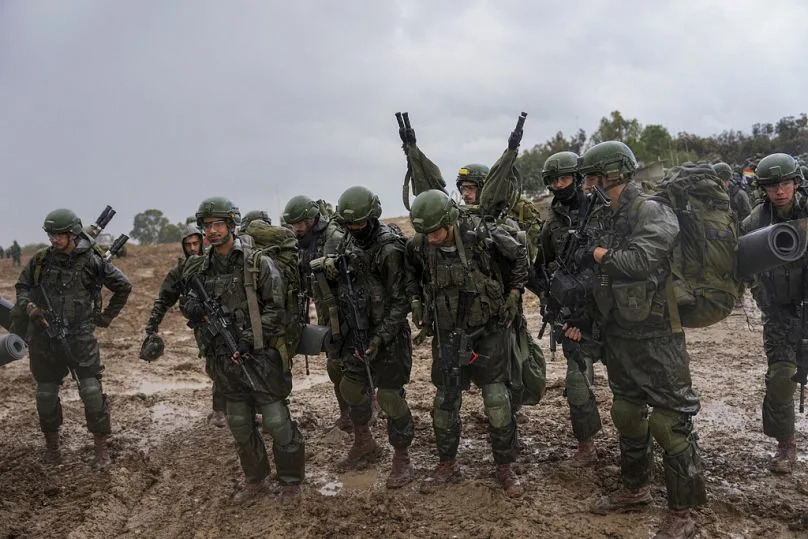
Clashes raged overnight and into Wednesday in multiple areas, with especially heavy fighting in Shijaiyah, a dense neighbourhood that was the scene of a major battle during the 2014 war between Israel and Hamas.
“It’s terrifying. We couldn’t sleep,” Mustafa Abu Taha, a Palestinian agricultural worker who lives in the neighbourhood, said. “The situation is getting worse, and we don’t have a safe place to go.”
The ambush took place Tuesday in Shijaiyah, where troops searching a cluster of buildings lost communication with four soldiers who had come under fire, the military said. When the other soldiers launched a rescue operation, they were ambushed with heavy gunfire and explosives.
Among the nine dead were Col. Itzhak Ben Basat, 44, the most senior officer to have been killed in the ground operation, and Lt. Col. Tomer Grinberg, a battalion commander.
Prime Minister Benjamin Netanyahu said it was a “very difficult day,” but he rejected international calls for a ceasefire.
“We are continuing until the end, there is no question. I say this even given the great pain and the international pressure. Nothing will stop us, we will continue until the end, until victory, nothing less,” he said in a talk with military commanders.
Suffering in the South
Heavy rainfall overnight swamped tent camps in Gaza’s south, where Israel has told people to seek refuge, even as that region has also come under daily bombardment.
In the central city of Deir al-Balah, the storm brought cold winds and flooded a sheltered area behind a hospital, sending torrents of water coursing between the tents. “The situation is catastrophic,” said Ibrahim Arafat, a father of 13 who fled Shijaiyah.
Because of the fighting and Israel’s blockade of Gaza, the health care system and humanitarian aid operations have collapsed in large parts of the territory, and aid workers have warned of starvation and the spread of disease among displaced people.
Israel invaded southern Gaza nearly two weeks ago, and heavy fighting has continued in its first target — the city of Khan Younis. Israeli strikes overnight hit two residential buildings in and around the city.
A strike on a home near the main highway between Khan Younis and the southern border town of Rafah killed two boys, ages 2 and 8, a woman in her 80s and a woman in her 30s, according to Mohammed al-Beiyouk, a relative of the deceased. Another strike killed a baby and his grandfather, according to hospital records at Nasser Hospital in Khan Younis.
The military rarely comments on individual strikes. Israel says it tries to avoid harming civilians and blames the high toll on Hamas because it conceals fighters, tunnels and weapons in residential areas.
Videos show Israeli soldiers acting 'maliciously'
Several viral videos and photos of Israeli soldiers behaving in a derogatory manner in Gaza have emerged in recent days, creating a headache for the Israeli military as it faces an international outcry over its tactics and the rising civilian death toll in its punishing war against Hamas.
In response, the Israeli army has pledged to take disciplinary action in what it says are a handful of isolated cases.
Among the scenes that have caused dismay and anger are clips of Israeli soldiers apparently rummaging through private homes in Gaza, destroying plastic figurines in a toy store, or trying to burn food and water supplies in the back of an abandoned truck. Troops have been depicted with their arms slung around each other, chanting racist slogans as they dance in a circle.
The videos seem to have been uploaded by soldiers themselves during their time in Gaza.
Such videos are not a new or unique phenomenon in Israel or around the world. Over the years, a significant number of soldiers have been caught on camera acting inappropriately or maliciously in myriad conflict zones.
Critics, though, say these new videos – which have been largely shrugged off in Israel – reflect a national mood that is highly supportive of the war in Gaza, with little empathy for the plight of Gaza's civilians.
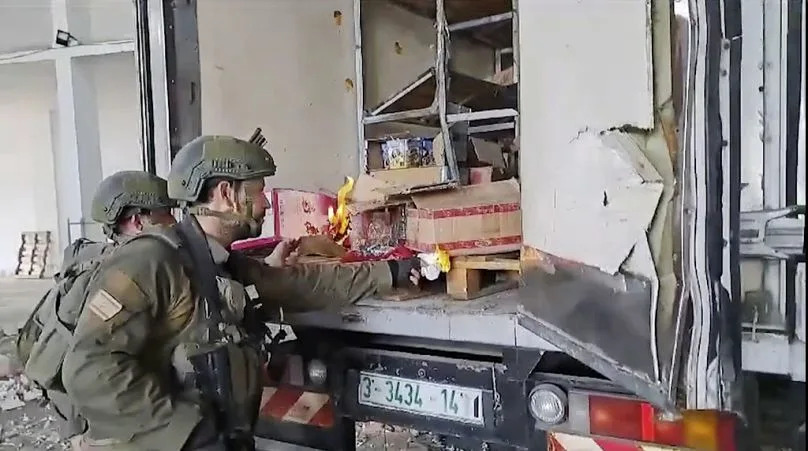
“The dehumanisation from the top is very much sinking down to the soldiers,” Dror Sadot, a spokeswoman for the Israeli human rights group B’Tselem, which has long documented Israeli abuses against Palestinians, told the Associated Press.
Israel has been embroiled in fierce combat in Gaza since 7th October, when Hamas militants raided southern Israel and killed about 1,200 people – mostly civilians – and took about 240 hostages.
'There are no people who are uninvolved' – IDF
In one video of IDF forces on the ground, troops are seen riding bicycles through rubble. In another, a soldier appears to have moved Muslim prayer rugs into a bathroom, while another video shows boxes of lingerie found in a Gaza home. Yet another clip shows a soldier trying to set fire to shipments of food and water, both extremely scarce in Gaza.
In one photograph, a soldier poses next to words spray-painted in red on a pink building that read: “Instead of erasing graffiti, let’s erase Gaza.”
A video posted by conservative Israeli media personality Yinon Magal on X, formerly Twitter, shows dozens of soldiers dancing in a circle, apparently in Gaza, and singing a song that includes the words, “Gaza we have come to conquer… We know our slogan - there are no people who are uninvolved.”
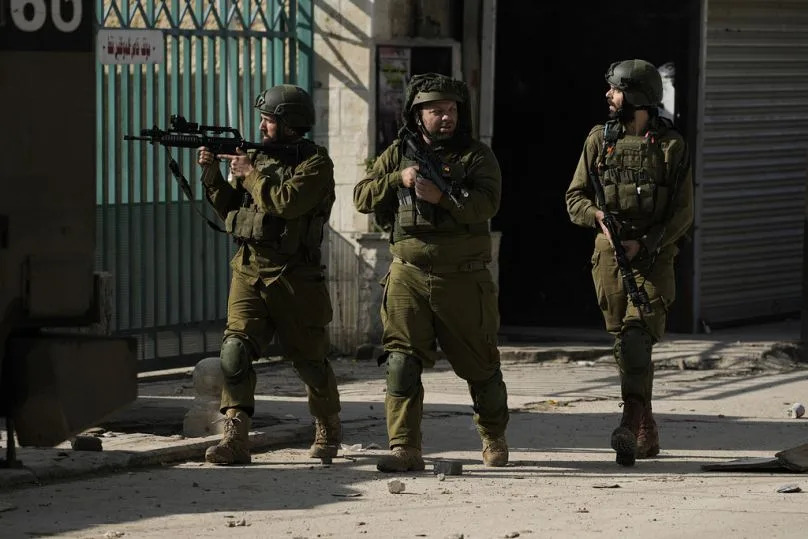
The video, which Magal took from Facebook, has been viewed almost 200,000 times on his account and widely shared on other accounts.
Magal said he did not know the soldiers involved – but the Associated Press has verified backgrounds, uniforms and language heard in the videos and found them to be consistent with independent reporting.
Magal said the video struck a chord among Israelis because of the popular tune and because Israelis need to see pictures of a strong military. It is based on the fight song of the Beitar Jerusalem soccer team, whose hard-core fans have a history of racist chants against Arabs and rowdy behaviour.
“These are my fighters, they’re fighting against brutal murderers, and after what they did to us, I don’t have to defend myself to anyone,” Magal told The Associated Press.
He condemned some of the other videos that have surfaced, including the ransacking of the toy store, apparently in the northern area of Jebaliya, in which a soldier smashes toys and decapitates a plastic figurine, as destruction that is unnecessary for Israel’s security objectives.
The Israeli military's spokesman, Rear Admiral Daniel Hagari, has actually condemned some of the actions seen in the recent videos.
"In any event that does not align with IDF values, command and disciplinary steps will be taken,” he said.
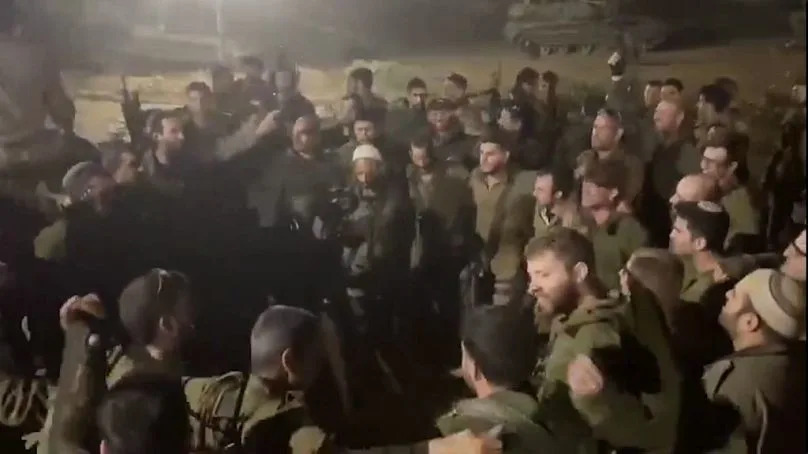
The videos emerged just days after leaked photos and video of detained Palestinians in Gaza, stripped to their underwear, in some cases blindfolded and handcuffed, also drew international attention. The army says it did not release those images, but Hagari said this week that soldiers have undressed Palestinian detainees to ensure they are not wearing explosive vests.
Osama Hamdan, a top Hamas official, aired the video of the soldier in the toy shop at a news conference in Beirut. He called the footage “disgusting.”
Hamas, too, has come under heavy criticism for releasing a series of videos of Israeli hostages, clearly under duress. Hamas militants also wore bodycams during their rampage on 7th October, capturing violent images of deadly attacks on families in their homes and revellers at a dance party.
Eran Halperin, a professor with Hebrew University's psychology department who studies communal emotional responses to conflict, said that in previous wars between Israel and Hamas, there may have been more condemnation of these types of photos and videos from within Israeli society.
But he said the October attack, which exposed deep weaknesses and failures by the army, caused trauma and humiliation for Israelis in a way that hasn't happened before.
“When people feel they were humiliated, hurting the source of this humiliation doesn’t feel as morally problematic,” Halperin told AP.
“When people feel like their individual and collective existence is under threat, they don’t have the mental capacity to empathise or apply the moral rulings when thinking about the enemy.”
- Questions and Answers
- Opinion
- Story/Motivational/Inspiring
- Technology
- Art
- Causes
- Crafts
- Dance
- Drinks
- Film/Movie
- Fitness
- Food
- Spiele
- Gardening
- Health
- Home
- Literature
- Music
- Networking
- Other
- Party
- Religion
- Shopping
- Sports
- Theater
- Wellness
- News
- Culture
- War machines and policy


